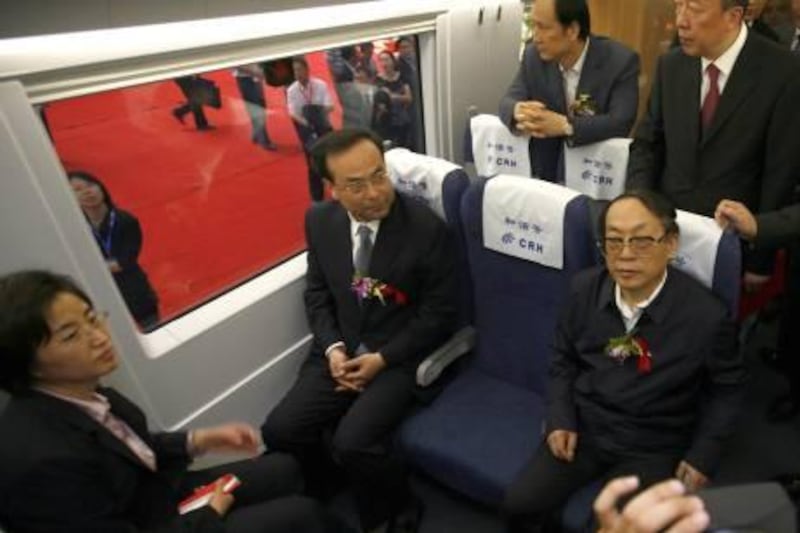BEIJING // The man who helped to usher in tens of billions of dollars of investment for China's showcase high-speed railway system would be expected to be riding high as more projects move towards completion.
But instead of being hailed as a hero, Liu Zhijun was sacked as railways minister last month and, according to state media reports this week, is being investigated for taking 822 million yuan (Dh460m) in kickbacks.
The growth of China's high-speed railways, and their potential for transforming the west of the country, has been compared to the way railroads opened up the American West in the 19th century. But the scandal has taken away some of the national pride in the programme and has underscored corruption within the government.
State media this week turned the spotlight on Mr Liu's private life, reporting lurid allegations that he had at least 10 mistresses, in a further sign that he is out of favour.
Mr Liu, 58, known for his unfashionable comb-over and nicknamed Leaping Liu for the way he spearheaded high-speed rail, was placed under investigation for a "severe violation of discipline". Reports mentioned "a large sum" in bribes.
Mr Liu took kickbacks of up to 4 per cent of the value of the contracts signed in eight projects, according to the Global Times newspaper, quoting local press reports.
One railway supplier, Ding Shumiao, with whom Mr Liu had a close professional relationship, received 422m yuan for introducing companies to the minister. Criminal charges are likely to be filed against the men.
Investigations into Mr Liu's activities began in January, and his removal from office after eight years sent shock waves through the railway industry. Stocks of companies in the sector fell amid speculation some projects would be cancelled.
China has been looking to spend more than $500 billion (Dh1.84 trillion) on extending its high-speed rail network to 25,000km by 2015, more than triple the current size. The expansion has been seen as key for promoting economic growth in western regions.
Mr Liu is one of the highest-ranking Communist Party officials to have been removed from office for corruption. In similar cases, the authorities have made an example of senior figures. Four years ago, the former head of the country's food and drug administration, Zheng Xiaoyu, was executed after being convicted of taking bribes to approve medicines, some of which were linked to several deaths.
Another prominent official, Zhang Shuguang, 54, the deputy chief engineer in the ministry, and director of its transportation bureau, has also been sacked and is being investigated for alleged "severe disciplinary violations", the Global Times said. A Hong Kong newspaper has said Mr Zhang has millions of dollars in US and Swiss bank accounts and that his wife owns three villas in California.
Corruption is endemic in China's bureaucracy. This week commentators have speculated that a vast programme of airport building is being driven in part by provincial officials who hope to get kickbacks.
One reason corruption is so widespread is because "the central leadership monopolises the anti-corruption channels", said Ding Xueliang, a professor at the Hong Kong University of Science and Technology. China, he said, was too large for such a system to work, unlike smaller bureaucracies such as that of Singapore.
"China is so big it's impossible. You have 80 million party officials and they control so many different types of resources, finances, land and personal appointments. "
Mr Ding said it should be easier for whistle-blowers to report corruption without fear of retribution.
Indeed it is not necessary to look further than Mr Liu's family to see the dangers facing people who expose corruption in China.
In 2006 his younger brother, Liu Zhixiang, a railway official from Wuhan city, received a suspended death sentence for a string of crimes that included bribery, embezzlement and arranging the murder of someone who reported that he had been taking bribes.






